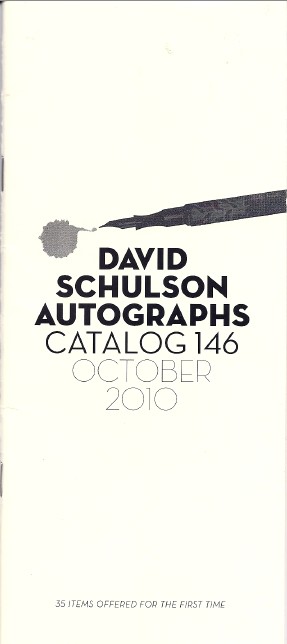Signed Items from David Schulson Autographs

Signed Items from David Schulson Autographs
By Michael Stillman
David Schulson Autographs recently released their Catalog 146. It contains a variety of inscribed and signed documents, along with more detailed material, such as letters and even a few signed drawings. The signers are all familiar names, people of significance in their chosen fields. They may come from science, literature, art, film, music, politics, or other fields. The common thread is their importance. Here are a few of the items we found in this latest catalogue.
Item 24 is a letter from playwright George Bernard Shaw to Erica Cotterill in 1908. Cotterill was a young lady, half the age of the 50-year-old Shaw, who became overly infatuated with the notable man. Shaw's thoughts about her are less clear. They could perhaps be described as some combination of condescension and irritation, accompanied by the pleasure of having your ego stroked and carrying on an illicit relationship that requires no intimacy, it being limited to the intimacy experienced in sending letters. The relationship went on longer than Shaw cared for, not as long as Ms. Cotterill would have liked. Cotterill was also a playwright, though generally considered a bad one, little remembered but for her relationship of sorts with Shaw. It is unclear to what this particular letter pertains, as Shaw is brief and terse in an evident reply to Ms. Cotterill. Writes Shaw, "Yes, yes; but oh! So unimportant. Dreadfully dull." Shaw undoubtedly felt this way about Ms. Cotterill, but the letter is probably about a subject, not her personally. Perhaps it relates to her play, or some aspect of it, as 1908 was the year she published her most notable play, if that can be said of any of her works, A Professional Socialist. Priced at $500.
Edward Everett Horton appeared in every film released from the 1920s-1940s, or at least it must have seemed that way. He didn't get the leading role, but he was a very popular character actor, often being the lead's best friend, or some bumbling clerk type of personality. He would later be a regular on television, or doing voice-overs on cartoons, right up until he died in 1970. Along the way, Horton purchased some real estate with his earnings, and one of his tenants was writer F. Scott Fitzgerald. Fitzgerald came to Hollywood in the late 1930s to be a screenwriter (he needed the money). Item 9 is a typed, signed letter, dated October 27, 1939, addressed to Mrs. Horton: "May I add my congratulations to the many you will receive today." Edward Everett Horton never married, but he lived with his mother, who was just celebrating her 80th birthday, which seems the logical explanation for this letter. $3,500.
Item 15 is a 1950 letter from filmmaker Fritz Lang to an unknown respondent. Evidently, the respondent was writing an article, and Lang sent him/her some photos from his most famous movie, 1926's Metropolis. It was a terrifying view of a city 100 years in the future (we're getting close now) where the elite lived high in the skyscrapers, while everyone else toiled mercilessly below. It was written by his then wife, Thea von Harbou. When the Nazis came to power, von Harbou warmly supported them, while Lang divorced and got out, emigrating to America. $3,000.